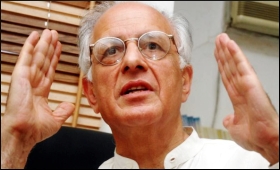|

|
Govt must create conditions to promote enterpreneurship: Arun Maira
|
|

|
|
| Top Stories |
 |
|
|
|
Prashant Sood | 01 Oct, 2015
After a recast of Planning Commission, India must change its five-year approach and make it a more dynamic exercise, even as conditions must be created to promore more jobs and enterpreneurship, Arun Maira, a former member of the erstwhile plan panel has said.
In an interview, Maira concurred with the Congress party stance on the government's new land bill, saying the present leadership had got swayed by investors and industry but was now on track by looking afresh clauses on consent from those displaced, and social impact assessment.
Maira, 72, whose book "An upstart in government: Journeys of Change and Learning" was released earlier this month, said that role of Niti Aayog set up by the Narendra Modi government must be "a coach and catalyst" and "not budget management and controller" as the plan panel had become.
The Modi government set up the Niti Aayog in place of Planning Commission earlier this year.
"The Planning Commission was focused much on approval of the plans of states and allocation of money to states and to the central ministries. It had become, in effect, a budget controlling and scheme controlling organisation," said Maira, who has also long served the Tata group.
"The charter of Niti Aayog does not give it any role in the budget allocation at all. It says role of Niti Aayog must be to make the federal system of India work in which the Centre is not going to be controlling the states."
Maira, a plan panel member from 2009 to 2014, said Niti Aayog must assist states to do better.
"There is a difference between assisting someone to do better and telling them what to do and controlling what they do. It is 180-degree shift almost in the orientation that is required of Niti Aayog compared to Planning Commission," Maira said.
"Since circumstances inside and outside keep changing and the amount one would have to spend on various schemes can be different, you have to have a more dynamic process of using resources as per your priorities. It is not a five-year rigid budget which one was calling a plan."
Maira said forward planning was, indeed, a good thing but an outlook could be made for 10 years to set out the vision. But one can be more exact only about the immediate future -- for around a year, he said, calling for rolling plans rather than rigid plan processes.
The governing council of Niti Aayog decided at its first meeting in February this year that the 12th five year plan (2012-17) will continue. But the council also decided that the aayog reviews the 12th plan to incorporate shared vision of the national development agenda.
On the politics of replacing the plan panel, Maira found the Congress position "strange".
"Manmohan Singh himself as prime minister said we can't continue with Planning Commission the way it is going on. He said it twice strongly. If the prime minister said that then why did the Congress say afterwards - no no, the Planning Commission was very good, why are you changing it?"
Asked if politics was behind Congress criticism, Maira -- who has many several books earlier, notably "Remaking India - One Country, One Destiny" and "Shaping the Future: Aspirational Leadership in India and Beyond" -- did not mince any words: "Absolutely," he replied.
But on the land bill, Maira said Congress has been right and lauded the changes it made in 2013. "These are necessary things if you want inclusive and sustainable growth. The objection from some people in industry was that is very complicated and will take too long," he said.
"The government got a little too swayed by investors," Maira said but added that after wanting to do away with the consultation mechanisms earlier, the reversal by the new government that we will not touch those processes was a welcome move.
The suave management consultant who has chaired the Boston Consulting Group in India earlier and worked with Arthur D. Little, was a concerned over how governments have been going about on the subject of creating more jobs and promoting enterprises and entrepreneurship.
"We must create conditions for the start of many more enterprises in the country. Also, the small enterprises must find it easy to do business," he said. "But we make it difficult for them."
|
|
|
| |
|
|
|
|
|
|
|
|
|
|
|
|
|
|
| |
| Customs Exchange Rates |
| Currency |
Import |
Export |
US Dollar
|
66.20
|
64.50 |
UK Pound
|
87.50
|
84.65 |
Euro
|
78.25
|
75.65 |
| Japanese
Yen |
58.85 |
56.85 |
| As on 13 Aug, 2022 |
|
|
| Daily Poll |
 |
 |
| PM Modi's recent US visit to redefine India-US bilateral relations |
|
|
|
|
|
| Commented Stories |
 |
|
|
|
|
|
| |
|